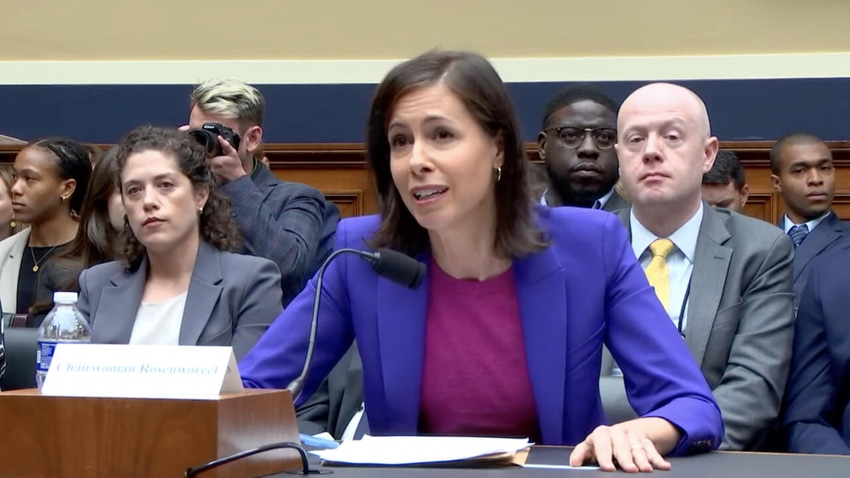Rosenworcel warns Congress that not funding ACP will 'cut families off'
Funding the Affordable Connectivity Program was a focal point for Democrats at an FCC House hearing Wednesday. Meanwhile, eight Senate Republicans expressed ACP support in a letter to President Biden.

With the Affordable Connectivity Program (ACP) set to run out of funding early next year, the importance of sustaining the program took center stage with House Democrats at an FCC oversight hearing on Wednesday.
The hearing was the FCC's first before the House Communications and Technology Subcommittee this year and touched on a range of issues from improved broadband mapping to the FCC's lapsed spectrum authority and beyond.
But one issue top of mind, at least for House Democrats, was the ACP. The program, which provides a monthly broadband subsidy for nearly 19 million households and counting, is currently projected to run out of funding as soon as April of next year, according to comments made by FCC Chairwoman Jessica Rosenworcel on Wednesday. Industry stakeholders and observers have been raising concern about the ACP's dwindling funds, and a lack of congressional action, for months.
Pressed by House Democrats on what the end of the ACP would mean for the country's efforts to close the digital divide, Rosenworcel stressed the importance of continuing funding.
"As a result of the bipartisan infrastructure law, we've got lots of funds to help with the deployment in largely rural areas, but we're also going to need funds and efforts to address affordability. ACP is the best program we have ever developed to do that, and we've got to make sure it continues," she said.
She further noted that the ACP works "hand-in-hand" with the $42.5 billion Broadband Equity, Access and Deployment (BEAD) program being administered by the NTIA. Alan Davidson, NTIA chief, has also recently stressed the importance of ACP to BEAD's success in front of Congress.
"If Congress were to fail to appropriate new funds for the Affordable Connectivity Program, we would undermine the biggest broadband affordability program this nation has ever created. We would cut families off," said Rosenworcel.
However, she also confirmed the FCC is exploring what that unwanted outcome will look like.
"First things first, we want to make sure that Congress continues to fund this program," said Rosenworcel. "But come this fall, we'll have to make hard decisions about what kind of choices will need to be made to wind this program down if Congress does not provide an additional appropriation, and we're taking a look at all of those issues right now."
A 'bipartisan' issue
While the ACP passed with bipartisan support in the 2021 Infrastructure Investment and Jobs Act (IIJA) – and maintains local bipartisan support with many Republican state governors, legislators and constituents – some Republicans in Congress have since expressed concern with the program's potential for waste, fraud and abuse, as well as the fact that it does not solely target "unconnected" households, indicating they may insist on curbing the ACP's eligibility requirements.
That view was supported by Republican FCC Commissioner Nathan Simington, who said in his opening testimony that "if Congress wants the program to endure, the FCC should look into the factors going into adoption and ensure that ACP dollars are driving adoption and uptake, not merely acting as a subsidy for broadband service that consumers would have purchased without such a subsidy."
However, Democratic Representative Tony Cárdenas (CA-29) disagreed: "The suggestion that this program should be narrowed to only those who would not otherwise have broadband seems to me to ignore the reality of family budgets, and the sacrifices many families often need to make to afford necessities that so many of us take for granted," he said.
Temporary funding path?
In discussing the ACP, several House members also referenced a letter sent to President Biden on Tuesday from eight Senate Republicans, including Senators Roger Wicker (MS), Mike Crapo (ID), Kevin Cramer (ND), Shelley Moore Capito (WV), James Risch (ID), Thom Tillis (NC), JD Vance (OH) and Todd Young (IN).
That letter, obtained by Light Reading, calls the ACP "an important tool in our efforts to close the digital divide," and further asks the White House to devote unused COVID relief funds to support the program.
"[We] urge the White House to repurpose a portion of unobligated emergency COVID relief funds to ensure the continuity of funding for this program, while we explore alternative sustainable funding mechanisms and updated parameters," wrote the senators.
The letter does not specify a funding amount. However, it offers a potential bridge to keep the program afloat in its current state while Congress debates whether and how to adapt it.
In response to a request for comment from Light Reading, a spokesperson for the White House did not directly address the suggestion posed in the letter but indicated continued cooperation with Congress.
"We appreciate the strong bipartisan support for the Affordable Connectivity Program," said Robyn Patterson, White House assistant press secretary. "We look forward to working with members of both parties to extend funding for the program so that it can keep lowering high-speed internet costs for tens of millions of American families."
Related posts:
— Nicole Ferraro, editor, Light Reading, and host of "The Divide" on the Light Reading Podcast.
Read more about:
ACPAbout the Author(s)
You May Also Like




_International_Software_Products.jpeg?width=300&auto=webp&quality=80&disable=upscale)







